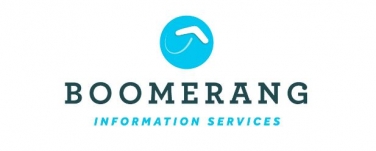

Boomerang Information Services, Inc.

Illinois, United States
October 2016
Other info service activities
Service with Minor Environmental Footprint
United States
Boomerang is one of Chicago’s most comprehensive, reliable and responsive research, and document management company. They work with legal service firms who serve the due diligence needs of corporations, law firms and lenders involved in mergers and acquisitions, commercial and residential real estate transactions, and lending activities within Illinois, Indiana, Massachusetts, Michigan, Oregon, Washington and Wisconsin counties. In Boomerang's daily work, they rarely get the opportunity to feel like they can make a difference in their community. Just by working to certify Boomerang as a B-Corp, their entire staff became even more aware of ways they can effect change in the communities around them. With that in mind, they expect to continue to expand on what they currently do and what they will learn to do in the future. This will be accomplished by engaging with other B-Corp members that share their goals. Also, with some of the changes they made to volunteering and pro-bono work, they will continue to educate themselves as they move through their community and environmental goals. It is through this hope that they will not only educate their clients and peers but also help develop their own understanding of their place in their community and the world around them.
Overall B Impact Score
Governance 17.7
Governance evaluates a company's overall mission, engagement around its social/environmental impact, ethics, and transparency. This section also evaluates the ability of a company to protect their mission and formally consider stakeholders in decision making through their corporate structure (e.g. benefit corporation) or corporate governing documents.
What is this? A company with an Impact Business Model is intentionally designed to create a specific positive outcome for one of its stakeholders - such as workers, community, environment, or customers.
Workers 39.2
Workers evaluates a company’s contributions to its employees’ financial security, health & safety, wellness, career development, and engagement & satisfaction. In addition, this section recognizes business models designed to benefit workers, such as companies that are at least 40% owned by non-executive employees and those that have workforce development programs to support individuals with barriers to employment.
Community 19.2
Community evaluates a company’s engagement with and impact on the communities in which it operates, hires from, and sources from. Topics include diversity, equity & inclusion, economic impact, civic engagement, charitable giving, and supply chain management. In addition, this section recognizes business models that are designed to address specific community-oriented problems, such as poverty alleviation through fair trade sourcing or distribution via microenterprises, producer cooperative models, locally focused economic development, and formal charitable giving commitments.
Environment 7.0
Environment evaluates a company’s overall environmental management practices as well as its impact on the air, climate, water, land, and biodiversity. This includes the direct impact of a company’s operations and, when applicable its supply chain and distribution channels. This section also recognizes companies with environmentally innovative production processes and those that sell products or services that have a positive environmental impact. Some examples might include products and services that create renewable energy, reduce consumption or waste, conserve land or wildlife, provide less toxic alternatives to the market, or educate people about environmental problems.
Customers 4.4
Customers evaluates a company’s stewardship of its customers through the quality of its products and services, ethical marketing, data privacy and security, and feedback channels. In addition, this section recognizes products or services that are designed to address a particular social problem for or through its customers, such as health or educational products, arts & media products, serving underserved customers/clients, and services that improve the social impact of other businesses or organizations.